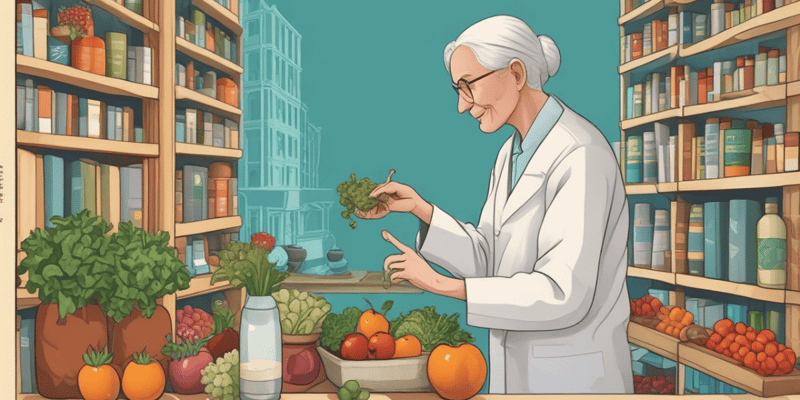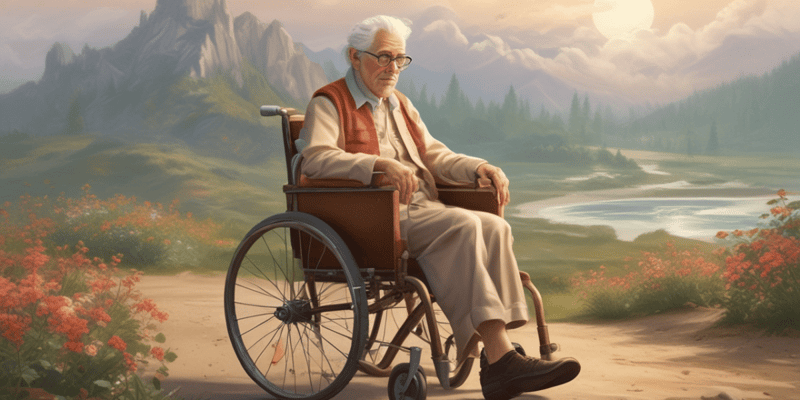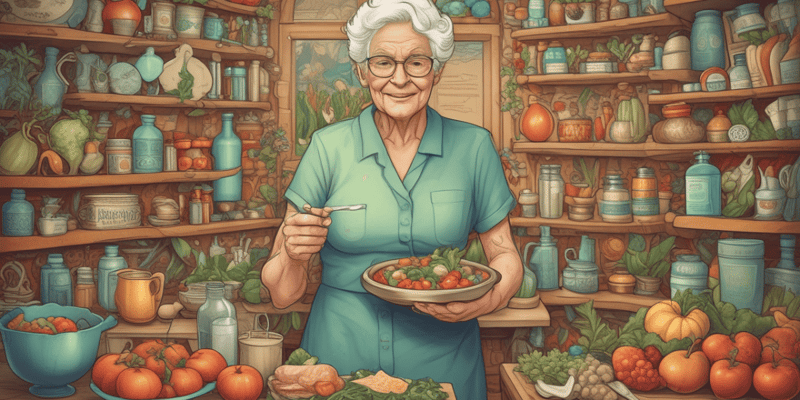Podcast
Questions and Answers
What percentage of nursing home patients experience malnutrition or undernourishment due to insufficient food intake?
What percentage of nursing home patients experience malnutrition or undernourishment due to insufficient food intake?
What is a possible effect of decreased metabolism in older persons?
What is a possible effect of decreased metabolism in older persons?
Which of the following is a degenerative change in the eye associated with aging?
Which of the following is a degenerative change in the eye associated with aging?
What is one of the reasons why older individuals may experience decreased appetite?
What is one of the reasons why older individuals may experience decreased appetite?
Signup and view all the answers
What is a possible effect of poor blood circulation in older persons?
What is a possible effect of poor blood circulation in older persons?
Signup and view all the answers
What is a result of atrophy of the mucosa and glands of the digestive tract in older individuals?
What is a result of atrophy of the mucosa and glands of the digestive tract in older individuals?
Signup and view all the answers
What is a possible consequence of diminished sense of taste and smell in older persons?
What is a possible consequence of diminished sense of taste and smell in older persons?
Signup and view all the answers
What is a degenerative change in the inner ear associated with aging?
What is a degenerative change in the inner ear associated with aging?
Signup and view all the answers
Why is constipation more common in older individuals?
Why is constipation more common in older individuals?
Signup and view all the answers
What is a complication of chronic constipation in older individuals?
What is a complication of chronic constipation in older individuals?
Signup and view all the answers
Why is obesity common in some older individuals?
Why is obesity common in some older individuals?
Signup and view all the answers
What is a result of obesity in older individuals?
What is a result of obesity in older individuals?
Signup and view all the answers
What is a complication of obesity in older individuals?
What is a complication of obesity in older individuals?
Signup and view all the answers
What is a result of insulin resistance caused by obesity in older individuals?
What is a result of insulin resistance caused by obesity in older individuals?
Signup and view all the answers
What is a major complication of aging related to urinary system?
What is a major complication of aging related to urinary system?
Signup and view all the answers
What is a result of incomplete emptying of the bladder in elderly people?
What is a result of incomplete emptying of the bladder in elderly people?
Signup and view all the answers
Why are elderly people at a higher risk for infections?
Why are elderly people at a higher risk for infections?
Signup and view all the answers
What is the effect of decreased estrogen levels in women on urinary system?
What is the effect of decreased estrogen levels in women on urinary system?
Signup and view all the answers
What is a result of weakened pelvic floor muscles in women?
What is a result of weakened pelvic floor muscles in women?
Signup and view all the answers
What is the result of reduced kidney function due to aging?
What is the result of reduced kidney function due to aging?
Signup and view all the answers
Study Notes
Physiological Changes in Older Adults
- Anorexia (decreased appetite) and feeling of not needing essential nutrients, leading to malnutrition.
- Difficulty chewing and swallowing, limiting dietary choices.
Gastrointestinal Changes and Nutrition
- Atrophy of digestive tract mucosa and glands, causing malabsorption of essential nutrients (vitamins, minerals, calcium, vit.B12, and iron).
- Decreased mucus secretion and thinning of mucosa, increasing the risk of peptic ulcer development.
- Constipation is more common in old age due to:
- Decreased activity
- Low fiber and fluid intake
- Excessive use of laxatives
- Constipation leads to:
- Prolonged exposure to carcinogenic substances, increasing the risk of malignancies in the digestive tract (stomach and colon)
- Hemorrhoids
- Obesity is common in some older individuals, particularly those who lead sedentary lives.
- Obesity increases the risk of:
- Cardiac workload and atherosclerosis
- Hypertension
- Gallstones
- Osteoarthritis
- Insulin resistance and metabolic syndrome
- Type 2 diabetes
Urinary System Changes
- Reduced kidney function due to loss of glomeruli and degeneration of tubules and blood vessels.
- Reduced bladder control due to:
- Weakened muscles of the urethra and bladder
- Reduced bladder capacity and incomplete bladder emptying
- Frequency, nocturia, and infection
- In women, stretched and weakened pelvic floor muscles reduce external sphincter control
- Decreased estrogen levels reduce smooth muscle tone
- Reduced sensory perception of a full bladder
- Weakened urethral sphincter, leading to incontinence
- Incontinence leads to:
- Incomplete emptying of the bladder
- Residual urine and frequent urinary tract infections
Other Factors
- Infections are common in older adults due to:
- Malnutrition and poor circulation, impairing normal defense mechanisms
- Delayed or diminished healing capacity
- Diminished autonomic nervous system adaptability
- Cancer is more common in older adults due to:
- Increased risk of malignancies in the digestive tract
- Other factors not specified in the text
Neurologic Changes (The Special Senses)
- Degenerative changes in the eye often impair vision:
- Cataract
- Glaucoma
- Presbyopia (farsightedness)
- Night vision impairment
- Vascular degeneration may affect the retina, causing permanent visual loss
- Degenerative changes in the inner ear:
- Hearing loss
- Impairment of communication and socialization
- Diminished sense of taste and smell may impair appetite and nutrition:
- Altered taste due to reduced salivary secretions or decreased perception within the central nervous system
Studying That Suits You
Use AI to generate personalized quizzes and flashcards to suit your learning preferences.
Description
This quiz covers the changes that occur in nutrition and digestion as people age, including decreasing appetite, difficulty chewing and swallowing, and gastrointestinal changes that affect nutrient absorption.




